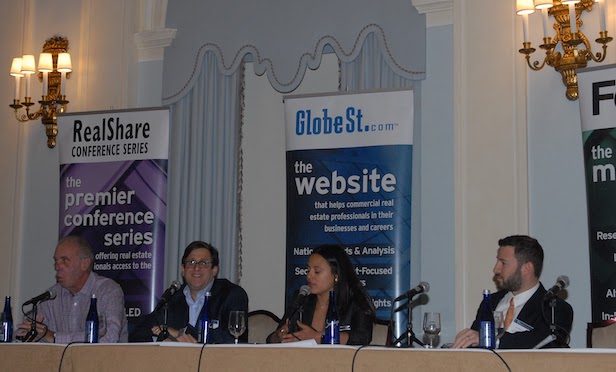 From left: Gregg Weisser, Michael T. Cohen, Vivianna Schwoerer, Jonathan Kaufman Iger/ Photo by Charles Garnar
From left: Gregg Weisser, Michael T. Cohen, Vivianna Schwoerer, Jonathan Kaufman Iger/ Photo by Charles Garnar
NEW YORK CITY—Efficiency means saving time, money or energy and these days it almost always involves technology, said Michael T. Cohen, president, tri-state region, at Colliers International. But efficiency in New York City today has taken a 180-degree reversal from trends of the 1980s.
New York City is filled with buildings that once served as headquarters for companies which moved, Cohen noted, referencing PepsiCo and JC Penney as examples from years ago.
“Efficiency in those days was defined by moving to a lower-cost environment for human capital for HR, for manpower, to places where you could find lots of reasonably educated folks who would work cheaply and push papers around. The back office left New York City and in some cases the front offices as well,” he said.
Amazon, a company that started on the West Coast in Seattle, recently elected to move thousands of jobs to New York City. Efficiency is now defined by the competition to retain and attract employees “who are ready to work in a technology industry that didn't exist 30 years ago,” said Cohen.
Vivianna Schwoerer is the global head of real estate transactions at WeWork, the largest co-working office space provider in the world, valued at $20 billion. Joining Cohen on the RealShare New York 2018 conference panel “Office Market: Seeking More Efficiency,” she said efficiency relates to effectiveness of space. She called WeWork a technology company. The company collects a vast amount of data that can tell a great story. But they are still trying to come up with ways that this data can better serve their members, she said.
Schwoerer described one example. “We use heat sensors around spaces to determine where people spend the majority of their time. Do they spend time in the common area or in the phone booth or at their desk? We found most people don't spend time at their desks, if they have a preference.”
Panelist Jonathan Kaufman Iger, CEO of Sage Realty Corporation, says his company gets to know their tenants, learning how they use their space. He has observed the following: 15 to 20 years ago, law firms in Class A offices allocated approximately 250 square feet per user. Firms with spaces of 100,000 square feet or more signed leases where 20% of that space was dedicated to future growth.
“Now, in New York City, you're seeing office space of 120 to 150 square feet per user,” said Iger. Administrative assistants once assigned to one partner now work with multiple attorneys resulting in less desk space required for support staff. Plus, law firms libraries have moved predominantly to the cloud.
“We look at the physical structure and ask where's the dead space that's not being utilized,” he stated. “We've amenitized space and thought about how people work in a shared space, how it's actually utilized, and their comfort levels, to use space more efficiently.”
The panel moderator, Gregg Weisser, SVP, director of leasing at the Moinian Group, asked about co-working and flexible space, which frequently tout increased efficiency. He acknowledged that his employer is an investor in Knotel, a WeWork competitor.
Weisser opined times are tougher for landlords competing for small tenants in small spaces. But WeWork continues to grow. Schwoerer is finding now institutional clients are becoming very receptive to conversations that were once happening only with tertiary markets. Many landlords are still trying to figure out whether the third party co-working and flex space operators are competitors or partners.
“Most landlords are saying I better take a certain amount of my portfolio and put it in flex office space, bringing in a professional intermediary like Knotel or WeWork. As a landlord, believe me, I don't want to buy furniture. I don't want to man the reception desk. I don't want to deal with the trivial daily concerns of these licensees. I am happy to outsource that,” said Weisser. “But I do want to be in that business. I want to take a portion of my inventory put it in the flex market and see what happens.”
© Touchpoint Markets, All Rights Reserved. Request academic re-use from www.copyright.com. All other uses, submit a request to [email protected]. For more inforrmation visit Asset & Logo Licensing.







